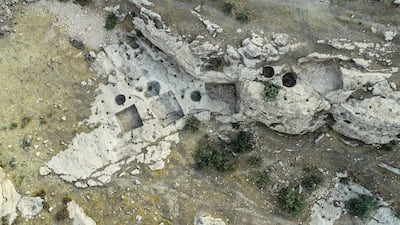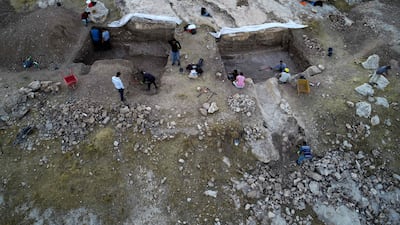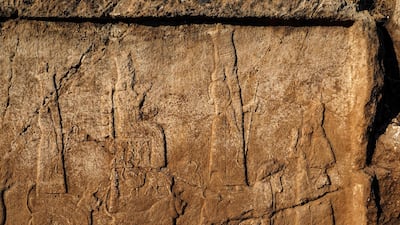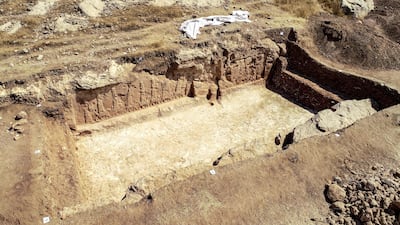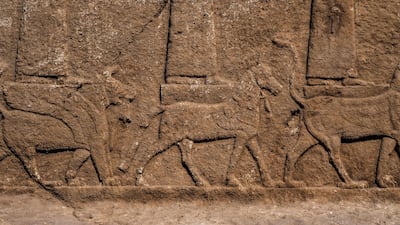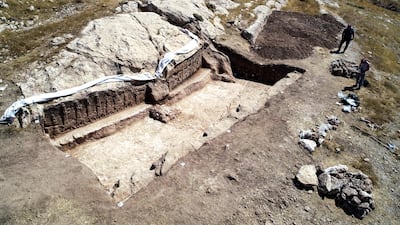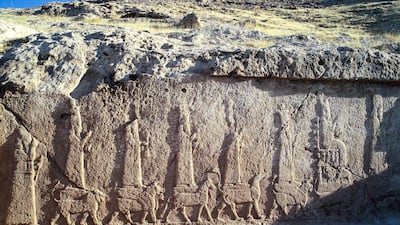Archaeologists in Iraq revealed on Sunday their discovery of a large-scale wine factory from the rule of the Assyrian kings 2,700 years ago, along with stunning monumental rock-carved royal reliefs.
The stone bas-reliefs, showing kings praying to the deities, were cut into the walls of a nearly nine-kilometre-long irrigation canal at Faydeh in northern Iraq, the joint team of archaeologists from the Department of Antiquities in Dohuk and colleagues from Italy said.
The carvings, 12 panels measuring five metres wide and two metres tall, show deities, kings and sacred animals. They date from the reigns of Sargon II (721-705 BC) and his son Sennacherib.
“There are other places with rock reliefs in Iraq, especially in Kurdistan, but none are so huge and monumental as this one,” said Italian archaeologist Daniele Morandi Bonacossi.
“The scenes represent the Assyrian king praying in front the Assyrian gods,” he said, noting that the seven key gods are all seen, including Ishtar, the goddess of love and war, who is depicted on top of a lion.
Ancient 'propaganda scene'
The irrigation canal was cut into limestone to carry water from the hills to the fields of farmers, and the carvings were made to remind people of the king who ordered its construction.
“It was not only a religious scene of prayer, it was also political, a sort of propaganda scene,” Morandi Bonacossi added.
“The king, in this way, wanted to show to the people living in the area that he was the one who has created these massive irrigation systems, so … the people should remember this and remain loyal.”
At Khinis, also near Dohuk, the team unearthed giant stone basins cut into white rock that were used in commercial wine-making during the reign of Sennacherib, in the late eighth or early seventh century BC.
“It was a sort of industrial wine factory,” said Morandi Bonacossi, professor of Near Eastern archaeology at Italy's University of Udine.
This was the first such discovery in Iraq, he said.
“We have found 14 installations, that were used to press the grapes and extract the juice, which was then processed into wine.”
Some of the most famous carvings that have survived from the Assyrian period are the mythical winged bulls, with examples of the monumental reliefs seen in the Iraq Museum in Baghdad, as well as the Louvre in Paris and the British Museum in London.
Iraq was the birthplace of some of the world's earliest cities. As well as Assyrians it was once home to Sumerians and Babylonians, and to among humankind's first examples of writing.
But it is also now a location for smugglers of ancient artefacts.
From 2014 and 2017, ISIS demolished dozens of pre-Islamic treasures with bulldozers, pickaxes and explosives. They also used smuggling to finance their operations.
However, some countries are slowly returning stolen items.
Earlier this year, the US returned about 17,000 artefacts to Iraq, pieces that mostly dated from the Sumerian period around 4,000 years ago.
Last month, a 3,500-year-old tablet recounting the epic of Gilgamesh was returned to Iraq after being stolen three decades ago and illegally imported to the US.
The specs: 2018 Jeep Grand Cherokee Trackhawk
Price, base: Dh399,999
Engine: Supercharged 6.2-litre V8
Gearbox: Eight-speed automatic
Power: 707hp @ 6,000rpm
Torque: 875Nm @ 4,800rpm
Fuel economy, combined: 16.8L / 100km (estimate)
Race card
1.45pm: Maiden Dh75,000 1,200m.
2.15pm: Maiden Dh75,000 1,200m.
2.45pm: Handicap Dh95,000 1,200m.
3.15pm: Handicap Dh120,000 1,400m.
3.45pm: Handicap Dh80,000 1,400m.
4.15pm: Handicap Dh90,000 1,800m.
4.45pm: Handicap Dh80,000 1,950m.
The National selections:
1.45pm: Galaxy Road – So Hi Speed
2.15pm: Majestic Thunder – Daltrey
2.45pm: Call To War – Taamol
3.15pm: Eqtiraan - Bochart
3.45pm: Kidd Malibu – Initial
4.15pm: Arroway – Arch Gold
4.35pm: Compliance - Muqaatil
COMPANY%20PROFILE%20
%3Cp%3E%3Cstrong%3ECompany%20name%3A%20%3C%2Fstrong%3ENomad%20Homes%3Cbr%3E%3Cstrong%3EStarted%3A%20%3C%2Fstrong%3E2020%3Cbr%3E%3Cstrong%3EFounders%3A%20%3C%2Fstrong%3EHelen%20Chen%2C%20Damien%20Drap%2C%20and%20Dan%20Piehler%3Cbr%3E%3Cstrong%3EBased%3A%3C%2Fstrong%3E%20UAE%20and%20Europe%3Cbr%3E%3Cstrong%3EIndustry%3C%2Fstrong%3E%3A%20PropTech%3Cbr%3E%3Cstrong%3EFunds%20raised%20so%20far%3A%3C%2Fstrong%3E%20%2444m%3Cbr%3E%3Cstrong%3EInvestors%3A%3C%2Fstrong%3E%20Acrew%20Capital%2C%2001%20Advisors%2C%20HighSage%20Ventures%2C%20Abstract%20Ventures%2C%20Partech%2C%20Precursor%20Ventures%2C%20Potluck%20Ventures%2C%20Knollwood%20and%20several%20undisclosed%20hedge%20funds%3C%2Fp%3E%0A
Abu Dhabi Card
5pm: Maiden (PA) Dh 80,000 1,400m
National selection: AF Mohanak
5.30pm: Handicap (PA) Dh 90,000 1,400m
National selection: Jayide Al Boraq
6pm: Handicap (TB) Dh 100,000 1,400m
National selection: Rocket Power
6.30pm: Abu Dhabi Championship Listed (PA) Dh 180,000 1,600m
National selection: Ihtesham
7pm: Wathba Stallions Cup Handicap (PA) Dh 70,000 1,600m
National selection: Noof KB
7.30pm: Maiden (PA) Dh 80,000 2.200m
National selection: EL Faust
Plan to boost public schools
A major shake-up of government-run schools was rolled out across the country in 2017. Known as the Emirati School Model, it placed more emphasis on maths and science while also adding practical skills to the curriculum.
It was accompanied by the promise of a Dh5 billion investment, over six years, to pay for state-of-the-art infrastructure improvements.
Aspects of the school model will be extended to international private schools, the education minister has previously suggested.
Recent developments have also included the introduction of moral education - which public and private schools both must teach - along with reform of the exams system and tougher teacher licensing requirements.
MATCH INFO
Manchester United v Manchester City, Wednesday, 11pm (UAE)
Match is on BeIN Sports
The Voice of Hind Rajab
Starring: Saja Kilani, Clara Khoury, Motaz Malhees
Director: Kaouther Ben Hania
Rating: 4/5
'How To Build A Boat'
Jonathan Gornall, Simon & Schuster
The biog
First Job: Abu Dhabi Department of Petroleum in 1974
Current role: Chairperson of Al Maskari Holding since 2008
Career high: Regularly cited on Forbes list of 100 most powerful Arab Businesswomen
Achievement: Helped establish Al Maskari Medical Centre in 1969 in Abu Dhabi’s Western Region
Future plan: Will now concentrate on her charitable work
Key changes
Commission caps
For life insurance products with a savings component, Peter Hodgins of Clyde & Co said different caps apply to the saving and protection elements:
• For the saving component, a cap of 4.5 per cent of the annualised premium per year (which may not exceed 90 per cent of the annualised premium over the policy term).
• On the protection component, there is a cap of 10 per cent of the annualised premium per year (which may not exceed 160 per cent of the annualised premium over the policy term).
• Indemnity commission, the amount of commission that can be advanced to a product salesperson, can be 50 per cent of the annualised premium for the first year or 50 per cent of the total commissions on the policy calculated.
• The remaining commission after deduction of the indemnity commission is paid equally over the premium payment term.
• For pure protection products, which only offer a life insurance component, the maximum commission will be 10 per cent of the annualised premium multiplied by the length of the policy in years.
Disclosure
Customers must now be provided with a full illustration of the product they are buying to ensure they understand the potential returns on savings products as well as the effects of any charges. There is also a “free-look” period of 30 days, where insurers must provide a full refund if the buyer wishes to cancel the policy.
“The illustration should provide for at least two scenarios to illustrate the performance of the product,” said Mr Hodgins. “All illustrations are required to be signed by the customer.”
Another illustration must outline surrender charges to ensure they understand the costs of exiting a fixed-term product early.
Illustrations must also be kept updatedand insurers must provide information on the top five investment funds available annually, including at least five years' performance data.
“This may be segregated based on the risk appetite of the customer (in which case, the top five funds for each segment must be provided),” said Mr Hodgins.
Product providers must also disclose the ratio of protection benefit to savings benefits. If a protection benefit ratio is less than 10 per cent "the product must carry a warning stating that it has limited or no protection benefit" Mr Hodgins added.
Lexus LX700h specs
Engine: 3.4-litre twin-turbo V6 plus supplementary electric motor
Power: 464hp at 5,200rpm
Torque: 790Nm from 2,000-3,600rpm
Transmission: 10-speed auto
Fuel consumption: 11.7L/100km
On sale: Now
Price: From Dh590,000
World Series
Game 1: Red Sox 8, Dodgers 4
Game 2: Red Sox 4, Dodgers 2
Game 3: Saturday (UAE)
* if needed
Game 4: Sunday
Game 5: Monday
Game 6: Wednesday
Game 7: Thursday
Sarfira
Director: Sudha Kongara Prasad
Starring: Akshay Kumar, Radhika Madan, Paresh Rawal
Rating: 2/5
Zidane's managerial achievements
La Liga: 2016/17
Spanish Super Cup: 2017
Uefa Champions League: 2015/16, 2016/17, 2017/18
Uefa Super Cup: 2016, 2017
Fifa Club World Cup: 2016, 2017
Our family matters legal consultant
Name: Hassan Mohsen Elhais
Position: legal consultant with Al Rowaad Advocates and Legal Consultants.
COMPANY%20PROFILE
%3Cp%3E%3Cstrong%3ECompany%3A%3C%2Fstrong%3E%20Vault%3Cbr%3E%3Cstrong%3EStarted%3A%20%3C%2Fstrong%3EJune%202023%3Cbr%3E%3Cstrong%3ECo-founders%3A%20%3C%2Fstrong%3EBilal%20Abou-Diab%20and%20Sami%20Abdul%20Hadi%3Cbr%3E%3Cstrong%3EBased%3A%20%3C%2Fstrong%3EAbu%20Dhabi%3Cbr%3E%3Cstrong%3ELicensed%20by%3A%3C%2Fstrong%3E%20Abu%20Dhabi%20Global%20Market%3Cbr%3E%3Cstrong%3EIndustry%3A%20%3C%2Fstrong%3EInvestment%20and%20wealth%20advisory%3Cbr%3E%3Cstrong%3EFunding%3A%20%3C%2Fstrong%3E%241%20million%3Cbr%3E%3Cstrong%3EInvestors%3A%20%3C%2Fstrong%3EOutliers%20VC%20and%20angel%20investors%3Cbr%3E%3Cstrong%3ENumber%20of%20employees%3A%20%3C%2Fstrong%3E14%3Cbr%3E%3C%2Fp%3E%0A
MATCH INFO
Uefa Champions League final:
Who: Real Madrid v Liverpool
Where: NSC Olimpiyskiy Stadium, Kiev, Ukraine
When: Saturday, May 26, 10.45pm (UAE)
TV: Match on BeIN Sports
360Vuz PROFILE
Date started: January 2017
Founder: Khaled Zaatarah
Based: Dubai and Los Angeles
Sector: Technology
Size: 21 employees
Funding: $7 million
Investors: Shorooq Partners, KBW Ventures, Vision Ventures, Hala Ventures, 500Startups, Plug and Play, Magnus Olsson, Samih Toukan, Jonathan Labin
BMW M5 specs
Engine: 4.4-litre twin-turbo V-8 petrol enging with additional electric motor
Power: 727hp
Torque: 1,000Nm
Transmission: 8-speed auto
Fuel consumption: 10.6L/100km
On sale: Now
Price: From Dh650,000
The specs: 2018 Mazda CX-5
Price, base / as tested: Dh89,000 / Dh130,000
Engine: 2.5-litre four-cylinder
Power: 188hp @ 6,000rpm
Torque: 251Nm @ 4,000rpm
Transmission: Six-speed automatic
Fuel consumption, combined: 7.1L / 100km
Red Sparrow
Dir: Francis Lawrence
Starring: Jennifer Lawrence, Joel Egerton, Charlotte Rampling, Jeremy Irons
Three stars
'THE WORST THING YOU CAN EAT'
Trans fat is typically found in fried and baked goods, but you may be consuming more than you think.
Powdered coffee creamer, microwave popcorn and virtually anything processed with a crust is likely to contain it, as this guide from Mayo Clinic outlines:
Baked goods - Most cakes, cookies, pie crusts and crackers contain shortening, which is usually made from partially hydrogenated vegetable oil. Ready-made frosting is another source of trans fat.
Snacks - Potato, corn and tortilla chips often contain trans fat. And while popcorn can be a healthy snack, many types of packaged or microwave popcorn use trans fat to help cook or flavour the popcorn.
Fried food - Foods that require deep frying — french fries, doughnuts and fried chicken — can contain trans fat from the oil used in the cooking process.
Refrigerator dough - Products such as canned biscuits and cinnamon rolls often contain trans fat, as do frozen pizza crusts.
Creamer and margarine - Nondairy coffee creamer and stick margarines also may contain partially hydrogenated vegetable oils.
Copa del Rey final
Sevilla v Barcelona, Saturday, 11.30pm (UAE), match on Bein Sports
Real Madrid 1
Ronaldo (87')
Athletic Bilbao 1
Williams (14')
Results:
6.30pm: Handicap | US$135,000 (Dirt) | 1,400 metres
Winner: Rodaini, Connor Beasley (jockey), Ahmad bin Harmash (trainer)
7.05pm: Handicap | $135,000 (Turf) | 1,200m
Winner: Ekhtiyaar, Jim Crowley, Doug Watson
7.40pm: Dubai Millennium Stakes | Group 3 | $200,000 (T) | 2,000m
Winner: Spotify, James Doyle, Charlie Appleby
8.15pm: UAE Oakes | Group 3 | $250,000 (D) | 1,900m
Winner: Divine Image, William Buick, Charlie Appleby
8.50pm: Zabeel Mile | Group 2 | $250,000 (T) | 1,600m
Winner: Mythical Image, William Buick, Charlie Appleby
9.20pm: Handicap | $135,000 (T) | 1,600m
Winner: Major Partnership, Kevin Stott, Saeed bin Suroor
Scoreline
Liverpool 3
Mane (7'), Salah (69'), Firmino (90')
Bournemouth 0
Read more about the coronavirus
The specs
Engine: 3.0-litre six-cylinder turbo
Power: 398hp from 5,250rpm
Torque: 580Nm at 1,900-4,800rpm
Transmission: Eight-speed auto
Fuel economy, combined: 6.5L/100km
On sale: December
Price: From Dh330,000 (estimate)
Essentials
The flights
Emirates and Etihad fly direct from the UAE to Geneva from Dh2,845 return, including taxes. The flight takes 6 hours.
The package
Clinique La Prairie offers a variety of programmes. A six-night Master Detox costs from 14,900 Swiss francs (Dh57,655), including all food, accommodation and a set schedule of medical consultations and spa treatments.
Three ways to get a gratitude glow
By committing to at least one of these daily, you can bring more gratitude into your life, says Ong.
- During your morning skincare routine, name five things you are thankful for about yourself.
- As you finish your skincare routine, look yourself in the eye and speak an affirmation, such as: “I am grateful for every part of me, including my ability to take care of my skin.”
- In the evening, take some deep breaths, notice how your skin feels, and listen for what your skin is grateful for.
Avatar%20(2009)
%3Cp%3E%3Cstrong%3EDirector%3A%20%3C%2Fstrong%3EJames%20Cameron%3C%2Fp%3E%0A%3Cp%3E%3Cstrong%3EStars%3A%20%3C%2Fstrong%3ESam%20Worthington%2C%20Zoe%20Saldana%2C%20Sigourney%20Weaver%3C%2Fp%3E%0A%3Cp%3E%3Cstrong%3ERating%3A%20%3C%2Fstrong%3E3%2F5%3C%2Fp%3E%0A
Our legal consultant
Name: Hassan Mohsen Elhais
Position: legal consultant with Al Rowaad Advocates and Legal Consultants
The specs: 2018 Nissan Patrol Nismo
Price: base / as tested: Dh382,000
Engine: 5.6-litre V8
Gearbox: Seven-speed automatic
Power: 428hp @ 5,800rpm
Torque: 560Nm @ 3,600rpm
Fuel economy, combined: 12.7L / 100km
RESULTS
4pm: Al Bastakiya Listed US$250,000 (Dirt) 1,900m
Winner: Yulong Warrior, Richard Mullen (jockey), Satish Seemar (trainer)
4.35pm: Mahab Al Shimaal Group 3 $200,000 (D) 1,200m
Winner: Jordan Sport, Adrie de Vries, Fawzi Nass
5.10pm: Nad Al Sheba Conditions $200,000 (Turf) 1,200m
Winner: Jungle Cat, William Buick, Charlie Appleby
5.45pm: Burj Nahaar Group 3 $200,000 (D) 1,600m
Winner: Kimbear, Patrick Dobbs, Doug Watson
6.20pm: Jebel Hatta Group 1 $300,000 (T) 1,800m
Winner: Blair House, James Doyle, Charlie Appleby
6.55pm: Al Maktoum Challenge Round-3 Group 1 $400,000 (D) 2,000m
Winner: North America, Richard Mullen, Satish Seemar
7.30pm: Dubai City of Gold Group 2 $250,000 (T) 2,410m
Winner: Hawkbill, William Buick, Charlie Appleby.
The biog
Age: 19
Profession: medical student at UAE university
Favourite book: The Ocean at The End of The Lane by Neil Gaiman
Role model: Parents, followed by Fazza (Shiekh Hamdan bin Mohammed)
Favourite poet: Edger Allen Poe
Asian Cup 2019
Quarter-final
UAE v Australia, Friday, 8pm, Hazza bin Zayed Stadium, Al Ain
ENGLAND SQUAD
Eoin Morgan (captain), Moeen Ali, Jonny Bairstow, Sam Billings, Jos Buttler, Tom Curran, Alex Hales, Liam Plunkett, Adil Rashid, Joe Root, Jason Roy, Ben Stokes, David Willey, Chris Woakes, Mark Wood
What%20is%20Dungeons%20%26%20Dragons%3F%20
%3Cp%3EDungeons%20%26amp%3B%20Dragons%20began%20as%20an%20interactive%20game%20which%20would%20be%20set%20up%20on%20a%20table%20in%201974.%20One%20player%20takes%20on%20the%20role%20of%20dungeon%20master%2C%20who%20directs%20the%20game%2C%20while%20the%20other%20players%20each%20portray%20a%20character%2C%20determining%20its%20species%2C%20occupation%20and%20moral%20and%20ethical%20outlook.%20They%20can%20choose%20the%20character%E2%80%99s%20abilities%2C%20such%20as%20strength%2C%20constitution%2C%20dexterity%2C%20intelligence%2C%20wisdom%20and%20charisma.%20In%20layman%E2%80%99s%20terms%2C%20the%20winner%20is%20the%20one%20who%20amasses%20the%20highest%20score.%3C%2Fp%3E%0A
THE SPECS
Cadillac XT6 2020 Premium Luxury
Engine: 3.6L V-6
Transmission: nine-speed automatic
Power: 310hp
Torque: 367Nm
Price: Dh280,000
SERIE A FIXTURES
Saturday Benevento v Atalanta (2pm), Genoa v Bologna (5pm), AC Milan v Torino (7.45pm)
Sunday Roma v Inter Milan (3.30pm), Udinese v Napoli, Hellas Verona v Crotone, Parma v Lazio (2pm), Fiorentina v Cagliari (9pm), Juventus v Sassuolo (11.45pm)
Monday Spezia v Sampdoria (11.45pm)





